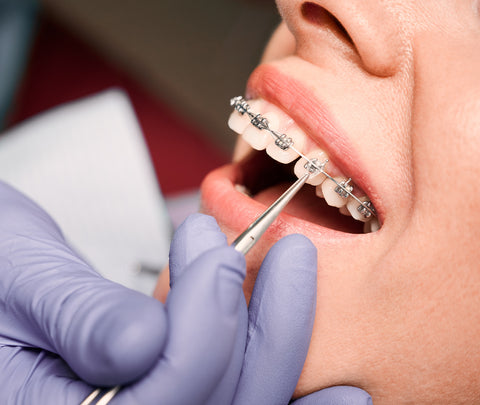What Are Elastics for Braces?

You may have seen these little elastic bands on others wearing braces and wondered what they are and what they do. You may be thinking about getting braces or in the process of undergoing orthodontic treatment and wonder what they are and if you will need them at some stage, so we’ve put together this article to shed some light on these little bands and if they can be of help in your orthodontic journey.
These tiny little elastic bands can be of huge help when it comes to your jaw and teeth alignment and help with things like overbite, underbite, open bite, and crossbite. So, let’s take a further look into how elastics could help you.
What are Elastics for Braces Used for?
As mentioned briefly above, elastics for braces are used to treat misaligned teeth, applying additional force to certain areas of the mouth to move teeth into a desired position and aim to correct issues such as underbite, overbite, open bite, and crossbite.
The elastics are little rings that sit around specific hooks or specific brackets on your braces, they generally run between the top and the bottom jaw and they are used to either close a gap between teeth, pull the upper teeth back and move the lower teeth forward or vice versa. There are 3 degrees of strength of the elastic band, light, medium, and heavy and this is decided by your orthodontists on the day of fitting.
Are Elastics Safe?
It may seem a little unsafe to keep elastic bands in your mouth, but it is very unlikely that the elastics will break and if it does happen, the elastics are so small and thin you can barely feel them ping in the first place. However, it is possible to have an allergy to latex, if you have this allergy then tell your orthodontist before fitting as there are synthetic bands available.
It's normal to feel some discomfort when the elastics are first fitted as they are moving your teeth into positions they have never been in before but usually taking an over-the-counter painkiller can take away the soreness and discomfort of aching teeth and gums.
How do I Know if I Will Need Elastics?
Not everyone with braces will need elastics in their brace treatment, at the time of your assessment, your orthodontist will check your jaw and teeth alignment to see if they are needed. Also, elastics aren’t something that are added at the very start of your treatment but are usually introduced later as a way of slowly increasing the force on your teeth.
Your orthodontic practitioner will be the person to initially fit your elastics if needed, however, they do lose their effectiveness over time as they stretch so it’s advisable to use fresh elastics daily. Your orthodontist will show you how to fit new elastics and where they are attached to your braces. Always replace the elastics at the same time so the forces exerted from them are equal.
It may be a surprise to learn that elastics aren’t just for people with braces but can be used for those undergoing Invisalign treatment and rather than the elastics attaching to hooks like on braces, they attached small buttons on the aligners.
Do I Need to Wear My Elastics All the Time?
Some people will only need to wear their elastics for a short amount of time if their teeth don’t need to move far and their teeth move quickly. Others with slower-moving teeth or that have further to go in their brace’s treatment will need to wear their elastics for longer.
The only time it is advisable to not be wearing your elastics is when you are brushing your teeth, other than that elastics should be worn almost all the time, day, and night unless your orthodontic practitioner has guided you otherwise.
Keeping a packet of spare elastics with you always is advisable in case you need new ones after eating or if one breaks and as mentioned previously, it’s advisable to change them regularly as they lose their effectiveness over time as they stretch.
Northenden House Orthodontics in Manchester
At Northenden House Orthodontics in Manchester, we specialise in providing high-quality orthodontic care to our patients and specialise in a range of treatments including metal braces, tooth coloured braces, hidden lingual braces, and Invisalign.
Elastics are just a small part of the journey in achieving the smile you want, so if you have any further questions on getting braces and what that involves then contact Northenden House Orthodontist in Manchester today to book or discuss an initial free consultation and find out more about the treatments available.
- Mohammad Malik

